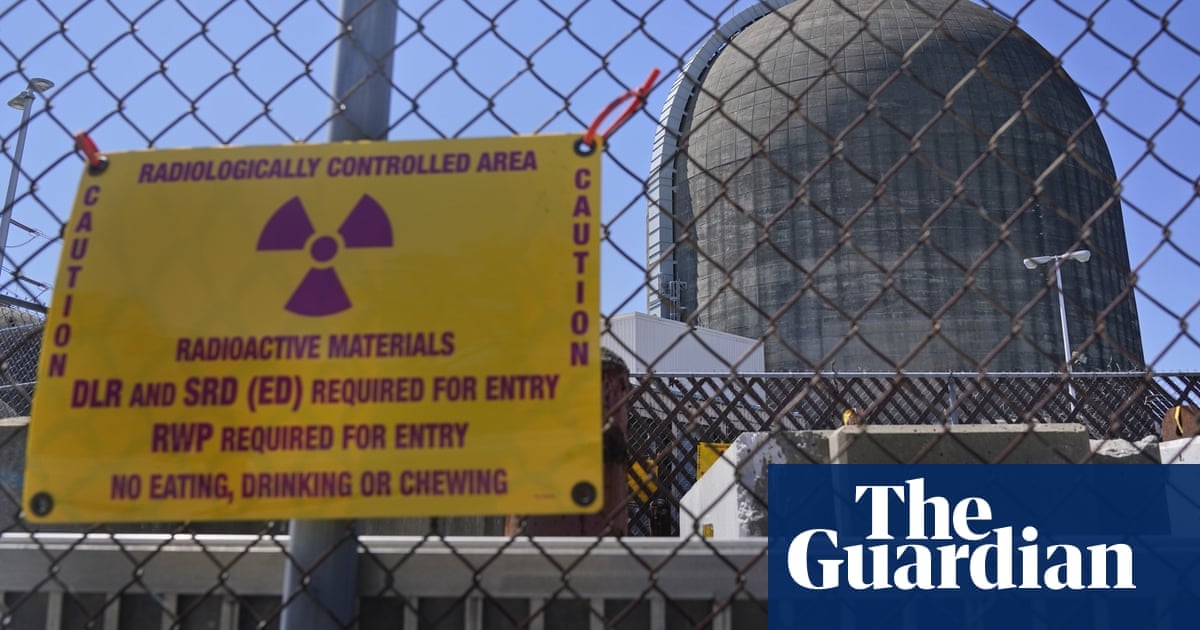Shuttering of New York facility raises awkward climate crisis questions as gas – not renewables – fills gap in power generation
When New York’s deteriorating and unloved Indian Point nuclear plant finally shuttered in 2021, its demise was met with delight from environmentalists who had long demanded it be scrapped.
But there has been a sting in the tail – since the closure, New York’s greenhouse gas emissions have gone up.
Castigated for its impact upon the surrounding environment and feared for its potential to unleash disaster close to the heart of New York City, Indian Point nevertheless supplied a large chunk of the state’s carbon-free electricity.
Since the plant’s closure, it has been gas, rather then clean energy such as solar and wind, that has filled the void, leaving New York City in the embarrassing situation of seeing its planet-heating emissions jump in recent years to the point its power grid is now dirtier than Texas’s, as well as the US average.



Huh? Bro what. What kinda oil shill would be promoting fuckn nuclear
Nuclear is incredibly expensive, uneconomic and for all countries starting only now would delay phasing out fossil fuels by decades of planning and construction. When they could start reducing fossil fuels and emmissions right now by building renewables and adding storage successively over years.
So the actual answer is: all of them. They know fossil fuels don’t have a future, so they have long changed to delay tactics.
Nuclear is very expensive to build it’s the cheapest to maintain. Even accounting for horrible disasters like Chernobyl it’s safer and less polluting. But yes, renewables are great! Most of our power where I live is from a dam. My grandpa had his house heated primarily via solar energy. They generated enough power through solar that they were able to sell it off to the energy dudes. When solar was bad they’d get power from the nearby wind turbines or the dam. All this stuff is great, it’s way better than coal but a single nuclear plant would out perform all of that energy generation and ultimately, cost less.
only if you dont count cost of salaries. Nuclear takes a lot of highly skilled people to run/maintain.
You tell me why people advocate for a more dangerous, more expensive option.
I figure it’s in the best interests of non-renewables to slow adoption of renewables any way they can - advocating for big expensive projects that typically go way over budget as the answer to the fossil fuels issue feels like a way for them to push back their reckoning.
A decade ago I thought nuclear was a good option, I’ve seen the data in the intervening time and renewables have scaled too quickly for nuclear to have any chance of keeping up. (At least, not without more research, as I think another commenter suggested should be our primary focus of any dollars allocated to nuclear.)
But I’m getting all the down votes, not counter arguments, so you tell me what’s going on.
I won’t aim to change your mind but I’ll add that one of the reasons they’re so expensive is, at least in the US, there is simply a struggle to build mega engineering projects. From project management to the blue collar skills required (nuclear isn’t the only large scale engineering project with cost overruns). Things were more favorable in the 80s when plants were built somewhat regularly and the country had collective experience completing these projects.
Renewables are similar too on both the installation and design side. More experience in manufacturing, developing, and installing helps to lower costs.
Yes, then deregulation really began, gutting our unions and thereby our trades. It robbed us of valuable experience for the benefit of a handful of wealthy people. It wasn’t a fair trade and we need to reverse it asap if we want to have a.futire as a society.
Well I’m not calling anyone an oil shill so I’m sure you’ll feel very persecuted no matter what’s said to you
Fair criticism. I’ll think on this.